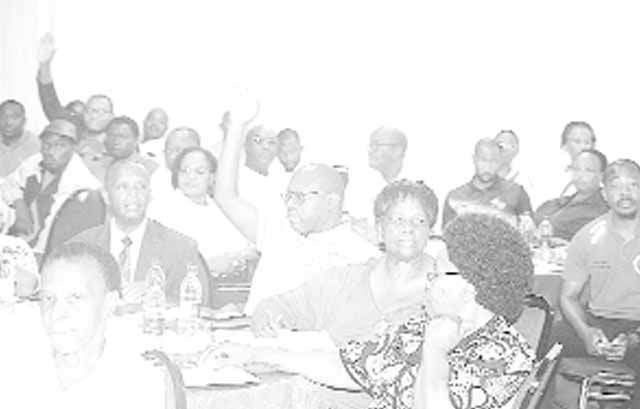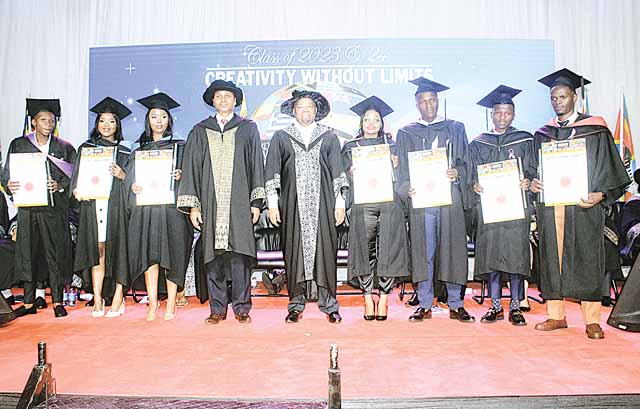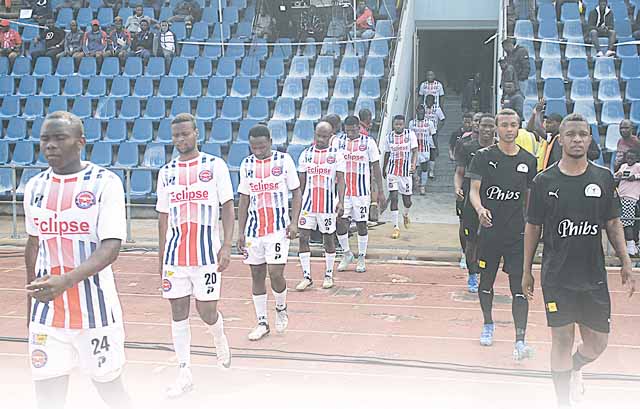By Nokuzola Thwala | 2024-11-17

Labour unions and consumer organisations are strongly opposed to the proposed electricity tariff hike by the Eswatini Electricity Company (EEC).
The organisations made their position known during the first public consultations hosted by the Eswatini Energy Regulatory Authority (ESERA), held at The George Hotel yesterday.
Arguing why they were against the hike in a highly charged and emotional meeting, they said ordinary Emaswati could barely cope with the already stiff tariffs and vehemently rejected any increase even if it was one per cent. The organisation implored ESERA not to allow it because the number of consumers would also decrease.
Among the stakeholders who made submissions included the Trade Unions Congress of Swaziland (TUCOSWA), Coordinating Assembly of Non-Governmental Organisation, (CANGO), Swaziland Democratic Party (SWADEPA), Eswatini Consumers Forum, civic society organisations and more.
This was despite the EEC Managing Director, Ernest Mkhonta, calling for support stating that the tariff increase was meant to make assistance sustainable, same services offered at a convenient time.
Sharing some of the drivers for the proposal, he noted the increase in import costs including cost of new generation, oil price increase leading to local fuel price fluctuations, metal price fluctuations like steak, copper affecting transformer prices and other materials, exchange rates and increase in the distribution network which, increase operating and maintenance costs.
He said they made assumptions that inflation would be 5.04 per cent in 2025, and 4.92 per cent in 2026, as projected by the Central Bank of Eswatini, geopolitics that might affect the projections made, Rand and Dollar exchange rate might increase, 15.22 and 15.82 in 2025 and 2026 respectively.
“In 2024, the tariff escalation import stands at 19.2 per cent. ‘‘We negotiated with ESKOM that load shedding doesn't affect us. they granted us because we were still paying well. Now ESKOM is not bending because we are now paying in instalments meaning, electricity load shedding will now affect us.
The impact on the future; financial implications include deferral of some capital projects which will have the effect of compromising the integrity of the network, delayed implementation of planned maintenance and depletion of cash reserves,” he said.
Platforms
He also said some of the planned activities were mobile money platforms for capital contributions payment options, online know your customer (KYC), statement self-service free of charge, corporate social responsibility initiatives like health, education, environment and more.
Mkhonta added that they anticipated projects to continue or start in the year 2025/26 and 2026/27 financial years under the generation Ferreira Cabal expansion at Dwaleni, emergency diesel generator 9MW and Qomintaba.
Despite his impassioned request for support, the organisations were unwavering in their opposition to the hike. TUCOSWA President, Bheki Mamba, said they would not allow any increment and would see to it that it did not happen.
Capacity
Mamba questioned EEC’s capacity to supply electricity considering that about E2.4 billion of the E4.2 to be received with the proposed hike for next year would go to importing electricity.
He said their belief was that EEC had already presented the proposal to government as a sole shareholder; hence the Prime Minister Russell Dlamini spoke from an informed point of privilege when he said the 25 per cent increase was unjustified.
Mamba added that it seemed as if EEC was now more concerned about profits, instead of its core mandate of serving the people and that out of the profits, the consumers were not benefitting, EEC only realised now that they had to construct different generating projects.
According to Mamba said they could not allow a situation where most members of the populace are at home, unemployed and living below the poverty line, to lose their work.
“Our stand is that we are against at tariff increment, even by one per cent, and we have indicated that and we will see to it that is does not happen. What is being said to us makes us belief that what EEC presented here is not what they presented to government, because the prime minister was not speaking uninformed,” he said.
This, Mamba argued, meant that EEC has not done what they were supposed to implement. He said they could not allow a situation where people lose their jobs highlighting that many SMEs never recovered after the pandemic, therefore, they do not see where EEC has engaged government on what could be done to also cushion members of the public like its other counterparts.
Other speakers that decried the proposed hike were Eswatini Consumers Forum Chairperson Mandla Ntjakala, his deputy Nontsetselelo Nkambule, CANGO ED Thembinkosi Dlamini, Khethukuthula Methula, Nhlanhla Dlamini to name a few.
They said the hike was like killing Emaswati who already were battling with low paying jobs, high unemployment and poverty. They questioned the high electricity import by the company, decrying the Covid-19 period where tariffs were at a zero per cent hike stating that it is such that led to the current stiff proposed hikes.
Tariff methodology-cost components for 2025/26
Presenting on the tariff methodology cost components for the year 2025/26, the Managing Director, Ernest Mkhonta said EEC applies for revenues to cover its expected costs, the tariff methodology sets out which costs are allowed.
He said they add imports, with operating costs less other income, plus depreciation, add return on assets and under (over) recovery, which he said give a total for the sales revenue
Mkhonta added that if they decrease their imported units, load shedding is inevitable and it will affect the country's economy, because manufacturers will be affected.
Motivating, he said they aimed to increase cost of sales, emphasised the importance of energy mix, and noted that different technologies are affected by different weather patterns, hence diversify risks.
He said they will also take advantage of cheaper technologies when input resources are in abundance like solar irradiance, in winter and more, factor in the outage risks and maintenance cycles to maintain reliable base load power supply
“Imports E2.488 billion plus operating costs less other income E1.188 billion plus depreciation E148 million plus return on assets (ROA) E400 million plug under recovery E5.8 million equalled sales revenue of E4.219 billion which will translate to 25. 51 per cent increase for 2025 and 27.016 per cent for 2026.
What the tariff will pay for as a portion of the required revenue for 2025/26 is 59 per cent imports, 4 per cent depreciation, 28 per cent operating expenditure (opex) and 9 per cent of everything else including the return and recoveries. The regulator allows us to apply for revenue to cover our cost, and these are cost components which are allowed,” he elaborated.
We’ve not come defend the position - ESERA
ESERA Chief Executive Officer Sikhumbuzo Tsabedze said what EEC presented was still a proposal, and they had to present the request to the people.
He said the decision by ESERA has to be implemented as is, with EEC adjusting its budget if need be. He said the regulator gives directives and EEC is supposed to implement it by policy.
“We have not come to defend a position but have to see that everything is done in order, hence, it is important for us to be here in order to be able to protect the consumer.
Government as a shareholder will have a say, as a regulator we rely on your input that we implement. Government as generally not interfered with the operations of the regulation, and guidance and interference made purely as a shareholder in 2020.
He said after prime minister’s sentiments, government released a statement through the spokesperson clarifying what he meant.
“Government has a say as a sole shareholder but, they interfered putting into consideration the people’s welfare at that time after COVID-19, all processes were followed when there was zero hike,” he said.
EEC’s proposal not practical – small businessman
What EEC is proposing is not practical as consumers are overstretched and the tax burden has increased on them as well.
Nhlanhla Dlamini made the submission, stating that as much as they as consumers, sympathised with the Eswatini Electricity Company (EEC) predicament, the above should be considered.
He quoted Minister of Finance Neal Rijkenberg that the pay as you earn (PAYE) and value added tax (VAT) are at E4.6 billion and E5.6 billion respectively. He said the proposal asked for over E4.2 billion in the first year, which he said is almost equivalent to tax collected as a country.
Dlamini emphasised that what EEC proposed what impractical, questioning where the money will come from. He noted that most people walk to work because they cannot afford to drive or take transport to work.
He said he understood that EEC had a problem in their hands which needed to be resolved, but it could not be resolved by the tariffs increase, at least for now. He suggested that EEC reviewed their model, find solutions that are viable and practical.
“The consumer is over stretched and the tax burden has increased. This is not practical, where exactly will this come from, a lot of people cannot afford transport and they walk to work, because there is no money in circulation.
Increase
We understand that EEC has a problem in their hand which cannot be sorted by the tariff increase. small and medium enterprises now if there will be an increase, this is cost will be carried by the consumer, EEC must find another option and review model,” stated Dlamini.
Further, he suggested that that they review maybe their headcount form 2028-2024, check their capacity, if profits previously cushioned the tariffs.
“My last question is; has EEC had any affordability study for their service. If yes, when the most recent one was and what were their findings, can customers afford. N
ext time they do something like this, there should be a line with cites that there has been a study on affordability by an independent consultant.
Let us reconsider the model if it is practical for such a small economy as ours,” he said.
Meanwhile, Eswatini Consumers Forum Deputy Chairperson Nontsetselelo Nkambule questioned the upper limit of Qomintaba where 10MW, is produced. She also wondered why EEC was never ready with projects that will counter drought and climate change effects.
She questioned why over 50 per cent of electricity was imported, leading to over reliance on other countries.
Nkambule added that EEC should be investing more in intellectual capacity so that the country can produce its own electricity.
“We are here today with the assumption that the service delivery and distribution has expanded, not looking into the decrease of transportation. Distribution means more people now need electricity as a basic commodity.
Why is government not cushioning this as well, the high unemployment rate and poverty is never considered when the increments are made?
The inflation itself starts affecting us as consumers, all the services rise in inflation and cost of living. What about those who do not have money,’’ he argued.
Responding, EEC Operations Manager Vusumuzi Gama said it was important that the entity exists and produces electricity, availing it to the public so that the economy is stimulated.
share story
Post Your Comments Below

The Prime Minister Russell Mmiso Dlamini has encouraged Limkokwing University of Creative Technol...

Labour unions and consumer organisations are strongly opposed to the proposed electricity tariff&...
Fraud is a phenomenon that has devastating effects which include loss of personal and organisatio...

SOCCER - MBABANE Swallows has become the latest top team to face scrutiny over a dispute with pla...
All material © Swazi Observer. Material may not be published or reproduced in any form without prior written permission.
Design by Real Image Internet